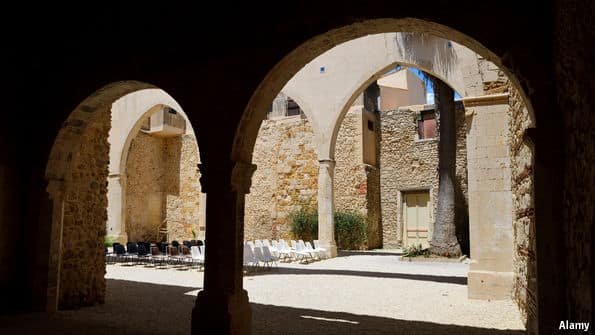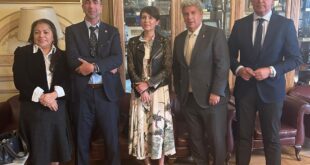Jewish revival in Sicily
Dormant for five centuries, Jewish life in Italy’s far south is stirring
Jewish memories awaken in Sicily

LIKE their co-religionists all over Europe, Italy’s Jews live with dreadful memories. Across the north of the country, communities suffered persecution under racial laws introduced by the fascist government in 1938, and then deportation and murder at the hands of the German Nazis from 1943. In the far south, a terminal, or near-terminal, event occurred much earlier. In 1492, Sicily’s once-flourishing Jewish community was expelled by the Spanish monarchs who held sway over the island; some fled to the nearby Kingdom of Naples but they were soon driven out of that realm, too, and duly headed eastwards to the comparative safety of Ottoman territory.
Small wonder, then, that among the 40,000 or so Jews who now live in Italy, only a handful are to be found anywhere south of Rome. In locations like the Giudecca (Jewish quarter) of Syracuse, an ancient Sicilian port, place-names and Hebrew inscriptions are among the few obvious reminders that the religion of ancient Israel was once practised here. The first impression (see picture) is of a place where the Catholic heritage has almost completely overlaid the Jewish one. Before 1492, the port had 12 synagogues and 5,000 Jews; that faith and culture have been undergoing a modest but determined local revival, as some long-dormant collective memories come to the surface.
Some people date the rebirth to the discovery in Syracuse in 1987 of a mikveh, a Jewish ritual bath, which may be among the oldest in Europe. That was one of things which inspired Stefano Di Mauro, an Orthodox Sephardic rabbi who had spent most of his life in America, to return to his native Sicily in 2007. Now the synagogue he founded, which is housed in a non-descript building but boasts a canopy, can count on crowds of 50 people or more at festivals and rites of passage. For more routine weekly services, the worshippers often number 12 to 15, just about satisfying the minyan or quorum of 10 men for a Jewish act of public prayer.
Many of the faithful tell remarkable stories about the way they embraced Judaism because of half-remembered family traditions. In Jewish terms, the community members seem mostly to be Bnei Anusim, the “children of the forced [ones]”; in other words, descendants of those who converted at least superficially to Christianity as a way to avoid expulsion.
Gabriele Spagna, aged 34, is one of them. Secretary of the synagogue and acting rabbi in Mr De Mauro’s absence, he discovered his Jewish identity when his grandmother disclosed a lifetime secret on her deathbed: she was a Jew. “When I was a kid, I remembered asking why she would light up candles on Friday night, putting them next to a window towards the east,” he remembers. “It all made sense after that acknowledgement.” For centuries, he explains, many local families had kept secret customs and rituals whose Jewish origins had been largely forgotten.
Mr Spagna has been leading Shabbat services in the past eight months, standing in while his teacher, Rabbi Di Mauro, is an on extended stay in Israel for family reasons. Other worshippers come from cities across the island, such as Catania, Taormina or Palermo, or even from the adjacent mainland.
One participant is Carmelo Zaffora, aged 56, a psychiatrist and history writer who says he comes to the synagogue as often as he can. A native of Gangi, a village close to Palermo, Sicily’s capital, Mr Zaffora says he has known Mr Di Mauro for more than 20 years and speaks with grateful astonishment of the rabbi’s tireless work in the field of “memory restoration”.
Salvatore Zurzolo, a 51-year-old lawyer, crosses a strait to come at least twice a month from Riace, a village in Calabria, the point of Italy’s boot. Raised a Catholic, he learned of his Jewish ancestry when his grandmother declined to receive the last rites from a priest. Her surname was Simoni, one that can denote “convert” ancestry. Mr Zurzolo remembers the old lady saying: “I’ve been hiding my whole life, but now let me die as a Jew.”
The very fact the people wait so long to declare their Jewish heritage says something about the region’s intensely Catholic ethos. Salvatore Palazzolo, a retired postman and student at Mr Di Mauro’s rabbinical school, says he had his first intuitive feelings about his forebears’ past when he was eight or nine. So when his dying grandmother confirmed the family’s Jewish heritage, he felt no surprise. But his father was much more cautious: “Don’t reveal this secret to anyone, we are alive only because we have been hiding.” Since the younger Mr Palazzolo started practising Judaism, he has been very cautious about telling his brothers.
The atmosphere may be changing. Last month, the Roman Catholic authorities in Palermo decided to cede part of a church, built on what once was a medieval synagogue, to Jewish believers. The move was perceived as a significant, if long-overdue, gesture of reconciliation, coming some 500 years after the Spanish edict of expulsion. Mr Palazzolo says the community is gradually gaining not only in numbers but in confidence that it can withstand social pressure. “We are slowly coming back home,” he says.
 eSefarad Noticias del Mundo Sefaradi
eSefarad Noticias del Mundo Sefaradi

